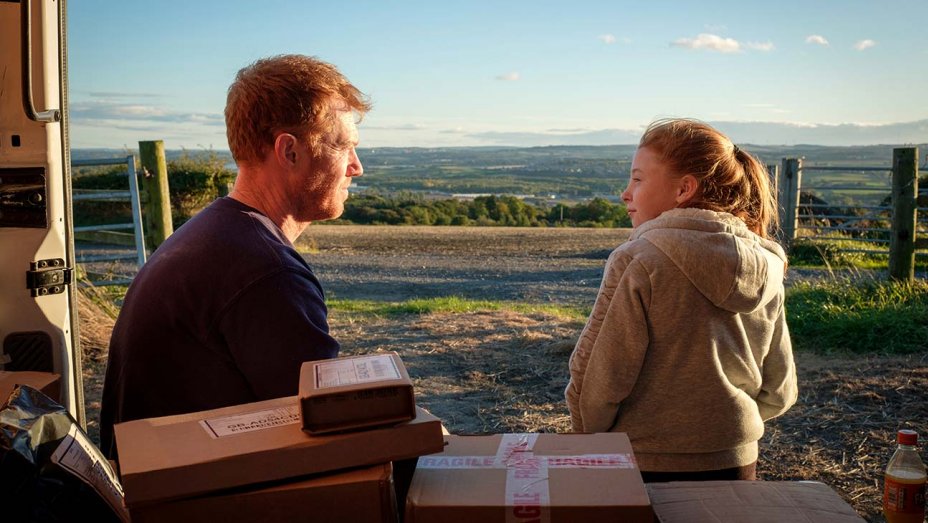Working with screenwriter Paul Laverty again, Sorry We Missed You focuses on the realities of the new gig economy of the neoliberal free market system, which promises workers more economic freedom and independence. However, the realities of this new working model are much different as dramatized here. Interesting to know is that Laverty studied in Rome at the Gregorian University where he got a philosophy degree.
The film opens on a black screen with only a voice, that of Ricky Turner interviewing for the chance to be his own boss as a driver for a parcel delivery company. Ricky has done everything from construction to landscaping to pipe laying and grave digging. A true journeyman. His family experienced hard times after the financial crisis when he lost his job in construction and subsequently their bank collapsed and they lost their house. Since then it’s been nothing but a struggle. The interviewer comforts Ricky that you don’t “work for us,” rather “you work with us.” You’re not an employee but you perform services. You don’t earn wages but fees. “Like everything around here, it’s your choice.” And Ricky has two choices, either buy a van or rent one on a very expensive daily basis in order to perform his work. To come up with the down payment for the van means having to sell his wife Abbie’s car that she uses to travel between her daily appointments as a care provider for the elderly and disabled
Now both parents are members of the gig economy. Forced to take the bus, Abbie does most of her parental duties by phone, leaving messages for 11-year old daughter Liza and teenage son Sebastian in between appointments, while on her public transportation journeys. With both parents working 14-hour days, it is no wonder that Sebastian starts skipping school and turning to public displays of graffiti with his friends. It doesn’t take long before working endless hours just to make ends meet, especially under the guise of “self-employment,” quickly wreaks havoc on a marriage, on a family, and on one’s personal health. All in an effort to stay ahead of the mounting debts. Abbie continues to have dreams of sinking in quicksand while her children try to rescue her by holding out sticks in an effort to save her. Liza, a kind soul just like her mother, just wants everyone to stop arguing.
Seb eventually gets suspended from school for fighting. And Ricky, forced to take a day off to deal with his son, finds out that he doesn’t actually receive holiday time off and has to pay a fee to the franchise to take the day off and also receives a disciplinary sanction for not providing enough notice time. Seb makes another bad choice and Ricky has more bad luck, causing Abbie to reach her breaking point.
The dream of being your own boss in certainly appealing in today’s competitive economic landscape. But the side effects and pitfalls take their excruciating toll and the unrealized dream soon diminishes to a harsher reality. Family matters more than success and Seb sums it up when he tells his father, “I just want you back the way you were, the way everything was…”
The New York Times critic Wesley Morris concluded his review on the film : “There’s no way for Loach to have gone smaller. When the movie’s over, you have, indeed, witnessed a tragedy, just not the usual kind. Nobody dies. No one goes to prison (there is one police-station visit unlike any I’ve seen). But life: that’s the tragedy, what it takes to get by, what it takes be just a little bit happy — for one lousy meal.”
Douglas Fahleson
This article is available in CineMag SIGNIS. Europe.


